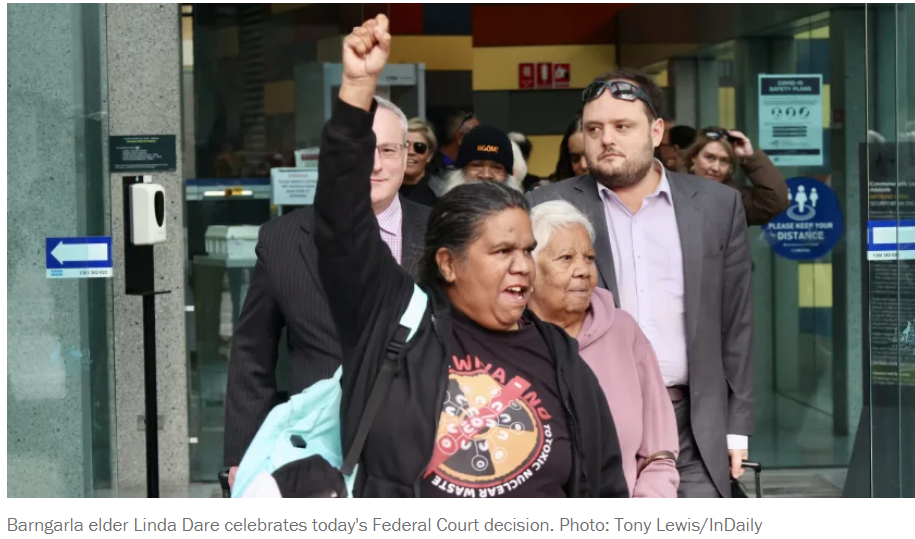
VANGUARD - Expressing the viewpoint of the Communist Party of Australia (Marxist-Leninist)
For National Independence and Socialism • www.cpaml.org
There were tears of joy outside the Federal Court in Adelaide this morning when Barngarla First Peoples and their supporters celebrated the quashing of the federal government’s decision to construct a nuclear waste dump at Napandee, near Kimba on Eyre Peninsula.
Earlier, the mood of the standing-room room only courtroom of Justice Natalie Charlesworth was solemn as she dismissed three of four grounds of the Barngarla’s case. However, the substantive fourth ground was upheld, with Justice Charlesworth finding that then federal Resources Minister Keith Pitt had shown “apprehended bias” in deciding in favour of the Kimba site, and therefore set his decision aside.
It is rare for a court to make a ruling of apprehended bias against a Minister, although the Federal Court last March made such a ruling against former Prime Minister Scott Morrison, quashing his decision to refuse to extend Asset Energy’s petroleum exploration permit, as his decision could be apprehended to have been predetermination following his overt public stance against the project.
At common law and under the Administrative Decisions (Judicial Review) Act 1977, the test for the Bias Rule extends beyond whether there is actual bias to whether there is an appearance of bias. An appearance or apprehension of bias may occur if, in the circumstances, a fair-minded lay observer may reasonably apprehend that the decision maker may not bring an impartial mind to their decision.
Leaving aside the legal niceties of the courtroom, it was the strength and courage of the Barngarla community that helped decide the issue. Uncle Harry Dare, a Barngarla elder told me as we waited for the court to open that regardless of which way the decision went, the Barngarla would continue their fight against the dump. They had strong allies among the farmers of Kimba who had their own organisation, No Radioactive Waste on Agricultural Land in Kimba or SA. However, they did not have the financial resources to fund their own court case against the decision, President Peter Woolford declaring that the system was unfair to those without such resources.
In a statement following the court decision, Woolford said that he was “extremely happy and relieved” that the court had decided in the Barngarla’s favour.
“Having also experienced the injustices and the manipulations that have occurred over the entire 8 year process, we fully understand the frustration and stress that the government’s tactics have caused. We are so pleased that the voices of the traditional owners have been heard and listened to, and that their unwavering opposition to this facility has finally been recognised.”
“What does this say about the Voice?”
Both Liberal and Labor federal governments have thrown huge amounts of taxpayer moneys to get the dump approved and to defend their process against the Barngarla’s pursuit of a court review of the process. Facilities around Kimba have benefitted from millions given to the town to entice its ratepayers to vote for the dump, with the promise of a community development package of up to $31 million once the dump was operational.
They also spent more than $10 million on their legal costs against the Barngarla, who over the same period had only spent $124,000 on their legal costs.
Barngarla Development Aboriginal Corporation chairperson Jason Bilney described the legal battle as a “David and Goliath” battle. He said that it was a very proud and emotional day.
He also asked what the long drawn-out case said about the Voice. The Barngarla had commissioned their own vote on the dump proposal and it had been unanimously opposed by the 83 respondents, yet the incoming Labor government continued to run with the dump, and their Resource Minister Madeleine King had shown her support for the dump on a visit to Kimba and by authorising work at the site despite the Federal Court case being still underway. The previous government and the current one had both ignored the Barngarla voice. He said today’s victory was for truth-telling.
The federal government now has two choices. It can appeal today’s decision, wasting more money, further disrespecting the Barngarla and throwing into even more doubt the sincerity of their promise to listen to the Voice of First Peoples. Or it can initiate a new search for a stable, deep underground repository for nuclear waste. The waste will not only be low level and intermediate level waste but must now, by virtue of the AUKUS arrangement, include high level waste from decommissioned nuclear-powered submarines. The search for a new site must work with, and not against, the communities concerned. Such a process of site identification must avoid what Peter Woolford said was the “absolute disgrace” of the Kimba process.